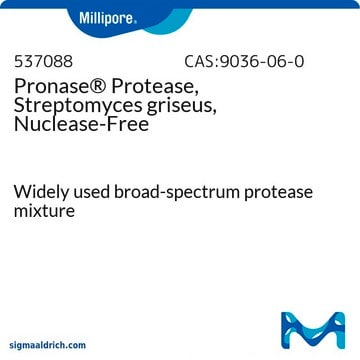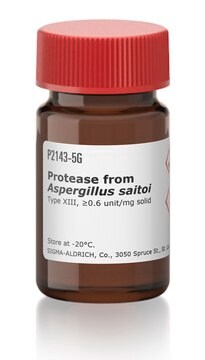53702
Pronase® Protease, Streptomyces griseus
Sinonimo/i:
Pronase® powder
Autenticatiper visualizzare i prezzi riservati alla tua organizzazione & contrattuali
About This Item
Prodotti consigliati
Forma fisica
lyophilized
Livello qualitativo
Attività specifica
≥45,000 proteolytic units/g dry wt
Produttore/marchio commerciale
Calbiochem®
Condizioni di stoccaggio
OK to freeze
desiccated (hygroscopic)
Solubilità
water: 10 mg/mL
Condizioni di spedizione
ambient
Temperatura di conservazione
2-8°C
Descrizione generale
A non-specific protease liquefies mucins and digests proteins to free amino acids. Can be used to isolate living chondrocytes. Most active at neutral pH, but it is stable over a wide pH and temperature range. Has an optimal pH of 7.5. Note: 1 KU = 1000 units.
A non-specific protease liquefies mucins and digests proteins to free amino acids. Can be used to isolate living chondrocytes. Most active at neutral pH, but stable over wide range of pH and temperature. Note: 1KU = 1000 units.
Note: 1 KU = 1000 units.
Attenzione
Toxicity: Harmful (C)
Definizione di unità
One unit is defined as the amount of enzyme that will liberate a digestion product equivalent to 25 µg of tyrosine per min at 40°C, pH 7.5.
Stato fisico
Lyophilized from a solution containing calcium acetate as a stabilizer.
Ricostituzione
Following reconstitution, store in the refrigerator (4°C). Stock solutions are stable for 24 h at 4°C.
Altre note
Narahashi, Y., et al. 1968. J. Biochem. 64, 427.
Note legali
CALBIOCHEM is a registered trademark of Merck KGaA, Darmstadt, Germany
PRONASE is a registered trademark of Merck KGaA, Darmstadt, Germany
Avvertenze
Danger
Indicazioni di pericolo
Consigli di prudenza
Classi di pericolo
Eye Irrit. 2 - Resp. Sens. 1 - Skin Irrit. 2 - STOT SE 3
Organi bersaglio
Respiratory system
Codice della classe di stoccaggio
11 - Combustible Solids
Classe di pericolosità dell'acqua (WGK)
WGK 2
Certificati d'analisi (COA)
Cerca il Certificati d'analisi (COA) digitando il numero di lotto/batch corrispondente. I numeri di lotto o di batch sono stampati sull'etichetta dei prodotti dopo la parola ‘Lotto’ o ‘Batch’.
Possiedi già questo prodotto?
I documenti relativi ai prodotti acquistati recentemente sono disponibili nell’Archivio dei documenti.
I clienti hanno visto anche
T E Davis et al.
Infection and immunity, 15(3), 978-987 (1977-03-01)
Enzymes capable of hydrolyzing cell walls of Blastomyces dermatitidis and chemotypes I and II of Histoplasma capsulatum were prepared in the laboratory or obtained from commercial sources. They included chitinases, beta-1,3-glucanases, beta-1,6-glucanase, and Pronase. Monosaccharides and disaccharides of glucose released
Nicole M Templeman et al.
Developmental cell, 54(1), 92-105 (2020-06-17)
Evolutionarily conserved signaling pathways are crucial for adjusting growth, reproduction, and cell maintenance in response to altered environmental conditions or energy balance. However, we have an incomplete understanding of the signaling networks and mechanistic changes that coordinate physiological changes across
Yifei Jiang et al.
Anesthesiology, 125(6), 1159-1170 (2016-09-23)
Exposure to isoflurane increases apoptosis among postnatally generated hippocampal dentate granule cells. These neurons play important roles in cognition and behavior, so their permanent loss could explain deficits after surgical procedures. To determine whether developmental anesthesia exposure leads to persistent
Jun Sunayama et al.
Stem cells (Dayton, Ohio), 28(11), 1930-1939 (2010-09-22)
The molecular signaling pathways orchestrating the biology of cancer stem-like cells (CSLCs), including glioblastoma, remain to be elucidated. We investigated in this study the role of the MEK/extracellular signal-regulated kinase (ERK) pathway in the control of self-renewal and tumorigenicity of
Kenya Terabe et al.
The Journal of biological chemistry, 294(47), 17799-17817 (2019-10-18)
Hyaluronan is a critical component of articular cartilage and partially helps retain aggrecan within the extracellular matrix of this tissue. During osteoarthritis, hyaluronan and aggrecan loss are an early sign of tissue damage. However, our recent attempts to mimic hyaluronan
Il team dei nostri ricercatori vanta grande esperienza in tutte le aree della ricerca quali Life Science, scienza dei materiali, sintesi chimica, cromatografia, discipline analitiche, ecc..
Contatta l'Assistenza Tecnica.














